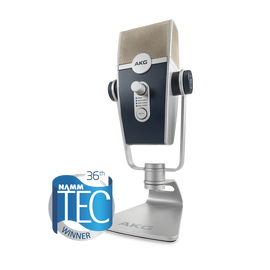
AKG Blog
How to get studio-quality sound from your smartphone with AKG Lyra
By Sarah jones
Whether you’re recording a podcast or voiceover, making field recordings, capturing audio inspiration on the go, or live streaming to your fans, nothing beats the convenience and portability of a smartphone. But while iPhones and Android phones are powerful devices that outperform many computers and cameras, let’s face it: Their audio functionality leaves a lot to be desired.
Sure, the microphones built into smartphones might sound fine for calls, but when it comes to professional recording or online broadcasting, they just don’t cut it. These mics utilize tiny transducers, which are noisy and distort easily, making them difficult to optimize gain. And, because mics on phones are tuned to pick up a narrower bandwidth of sound, specifically the midrange of the human voice, they are not optimal for full-frequency recording or live streams.

Connecting an external microphone to your phone will exponentially improve the quality of your recordings. The AKG Lyra is the perfect partner for your smartphone.
Connecting an external microphone to your phone will exponentially improve the quality of your recordings. The AKG Lyra Ultra HD Multimode USB microphone is the perfect partner for your smartphone: Lyra records pro-grade high-resolution audio, offers four focus patterns for any recording scenario, and interfaces easily with both iOS and Android devices.

You can follow these same steps to use Lyra with iOS or Android tablets.
If you’re using your Lyra with a smartphone, you’ll need a simple adapter. Start by connecting your phone adapter, then plug in your mic. Lyra has a USB C port, located on the underside of the unit. Connect the included USB C-to-USB A cable. Your next step will depend on your phone:

You’ll need an OTG (On the Go) adapter to use Lyra with Android devices.
iPhone Devices (iOs 10.7+): To provide enough power to use Lyra with an iPhone, you’ll need to add a powered USB hub. Connect Lyra’s included USB C-to-USB A cable to Lyra’s output, then connect the other end to the USB hub, then connect your hub output to your iPhone using an Apple Lighting to USB Camera Adapter.
Android OTG Devices (9+): Connect your included USB C-to-USB A cable to output into an OTG (On the Go) adapter, which connects to your phone. Many newer Android phones include an OTG adapter in the box to assist in data transfer from your old phone to your new phone, so you may already have what you need.

Don’t Forget the Headphones: Then, plug in a great pair of headphones. (For protection, always start with your volume down.) Fire up your preferred recording application or go live on your favorite platform, adjust your microphone gain and you’re ready to start creating or streaming with studio-quality sound.
It’s that easy.
Related products
AKG Blogs
9 pro tips for livestreaming your show from home
If you’re like most musicians, gigs are your lifeblood. But when you can’t connect with your audience in person, livestreaming is your best opportunity to gain new fans and generate income while building momentum for your next show.
Read MoreHow to Pick Professional Headphones for Any Scenario
What’s your most-used piece of audio gear? You probably don’t need us to tell you that it’s your headphones. Headphones provide a consistent audio reference in a variety of environments, they’re essential tools for evaluating the fine details in your mix—and they do it without annoying the neighbors.
Read MoreComparing digital & analog wireless mic systems
Since the release of AKG’s new DMS 100 and DMS 300 digital wireless systems, we’ve fielded lots of questions about the differences between digital and analog systems, so we thought it would be helpful to explain the benefits of each.
Read MoreHow to choose the right microphone to record anything
Choosing the right mic is more art than science, and involves trial and error. Getting to know the “sound” of the mics you own and learning how they perform in different scenarios are the first steps toward making professional-sounding recordings at home.
Read MorePro sound for work-at-home professionals
Whether your home office or classroom is temporary or permanent, HARMAN has affordable, easy-to-use tools that will help you communicate with clarity and focus on the task at hand.
Read More7 ways to sound better on a conference call
Conferencing services like Zoom, Skype and Webex bring familiar faces right to your screen—and chances are, conference calls are becoming a central part of your life right now.
Read MoreHow to get studio-quality sound from your smartphone with AKG Lyra
Whether you’re recording a podcast or voiceover, making field recordings, capturing audio inspiration on the go, or live streaming to your fans, nothing beats the convenience and portability of a smartphone.
Read MoreAKG DMS300 Digital Wireless Systems Earn High Praise from Performer Magazine
Wireless microphone systems have come a long way over the years, and the AKG DMS300 digital system is no exception. Once thought of as inferior to their wired counterparts, many wireless systems like DMS300 not only sound just as good—if not better—than wired systems.
Read More










